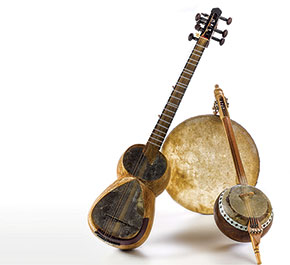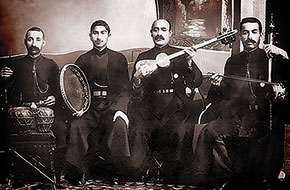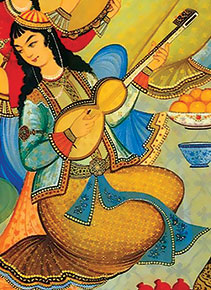When Canadian Colleen MacDonell took up the kamancha she bridged the gap between Western music and Azerbaijani mugham. Likening it to a childhood game of jumping up and down steps, she says mugham is not as easy to play – or listen to – but we should all give the strange sounds a chance.
When I was a child I played a game on our porch steps, creating little routines. Two up, one down, crisscross feet, three up, two down, one up… On and on, I would create a pattern and then try to repeat it. The fact I really enjoyed this is probably an indication of just how bored a kid can get growing up in rural Canada! At least it was good exercise.
I recalled this childhood pastime many years later after I moved to Baku and took up a traditional Azerbaijani musical instrument, the kamancha. As I started the painfully slow process of learning how to hold it, how to bow, how to turn it and to press down hard on one of the four strings, it occurred to me that this was much like my old game. That is how I described the music to other foreigners: “It’s like going up and down steps,” I would say, and they would look at me strangely…
In American musician Jeffrey Werbock’s brilliant article (see page 88) he describes mugham as “not particularly ‘melodic’”. It is rather a sequence of tones that rise and fall “in a manner known as staircase composition”.* I knew it!
To most Western ears, mugham sounds completely improvised. It is not. Coming from a Western musical tradition, it is difficult to open our ears to a musical form that is metre-free. To quote Werbock again: Metre-free melodies have no time signature, no beat, no regular, steady rhythm. Each phrase or cümlə – literally “sentence” – is quite different in pattern, tone and rhythm from the previous, but they do link together. Somehow, in listening to mugham, and especially in playing it, the logic has surfaced. While I cannot (yet) explain how it works musically, I can feel it emotionally.
Mugham is a strange and beautiful musical form. What has fascinated me from the beginning is how disparate and seemingly unconnected patterns slowly build to an intense emotional climax. The music gradually lifts your mind upwards, carrying you to a resolution that is at the same time a logical outcome and a cathartic experience. Learning to hear this can be difficult. When I first started to learn mugham, my teacher would repeat a single cümlə until I knew it by heart. Then, I would learn a second, and play that too until I knew it by heart. Then, I would play both together until I had it down to a T.
My first teacher was a woman of amazing patience. I would leave her apartment buoyed by the experience of learning two new and surprising phrases of music. I would climb down the five flights of stairs of her small Khrushchev-era building, going over the tones and patterns in my head. I would wait for the number 18 bus, still humming. Finally the bus would come and I would climb aboard, only to be assaulted by pop music from the avtobus radio. And immediately those two precious cümlə would disappear…
I soon realised that I needed to record each session or I would never make any progress. I still use that method now. Even after years of playing it is amazing how quickly the music can slip away from you. In my early days of learning mugham, this happened with heartbreaking regularity. I described it to friends as trying to catch a fish with your bare hands. The phrase just kept slipping away from me, as hard as I would try to grasp it. There were times when I thought I had it, but I had in fact changed it to fit my Western music ear.
With time I came to recognise the music more and more as music. I could see where the patterns were going. I would laugh with delight. I would be moved to tears. I would yearn for the final part of the mugham so that I could play it in its entirety and see and feel both the logic and the emotional power of the piece.
The greatest compliment I have had from my current teacher is when he covered his eyes and said, “If I didn’t look at you, I would think you were Azerbaijani.” I feel immensely privileged to have discovered this music and to feel it with an Azerbaijani soul. Come, listen with me. Listen and listen until you feel it too.
About the author: Colleen MacDonell is a kamancha-playing librarian who has worked at international schools in Baku. She arrived in Baku in 2007 and has been studying the language and music of Azerbaijan in her spare time. Visit her language learning blog at http://speakazeri.blogspot.com.
* It’s hard to understand music by reading print. To help readers get a sense of staircase composition I have placed two parts from Bayati Shiraz online. It is just me playing my kamancha in my living room, very low tech and bare bones, but you should be able to see and hear the business of going up and down steps.
For example one, search for Staircase Composition 1 on Youtube, or go straight to: http://youtu.be/DbOfiluo3QI
For example two, search for Staircase Composition 2 on Youtube or go straight to: http://youtu.be/Eq4o0MTYTL4
When I was a child I played a game on our porch steps, creating little routines. Two up, one down, crisscross feet, three up, two down, one up… On and on, I would create a pattern and then try to repeat it. The fact I really enjoyed this is probably an indication of just how bored a kid can get growing up in rural Canada! At least it was good exercise.
I recalled this childhood pastime many years later after I moved to Baku and took up a traditional Azerbaijani musical instrument, the kamancha. As I started the painfully slow process of learning how to hold it, how to bow, how to turn it and to press down hard on one of the four strings, it occurred to me that this was much like my old game. That is how I described the music to other foreigners: “It’s like going up and down steps,” I would say, and they would look at me strangely…
In American musician Jeffrey Werbock’s brilliant article (see page 88) he describes mugham as “not particularly ‘melodic’”. It is rather a sequence of tones that rise and fall “in a manner known as staircase composition”.* I knew it!
To most Western ears, mugham sounds completely improvised. It is not. Coming from a Western musical tradition, it is difficult to open our ears to a musical form that is metre-free. To quote Werbock again: Metre-free melodies have no time signature, no beat, no regular, steady rhythm. Each phrase or cümlə – literally “sentence” – is quite different in pattern, tone and rhythm from the previous, but they do link together. Somehow, in listening to mugham, and especially in playing it, the logic has surfaced. While I cannot (yet) explain how it works musically, I can feel it emotionally.
Mugham is a strange and beautiful musical form. What has fascinated me from the beginning is how disparate and seemingly unconnected patterns slowly build to an intense emotional climax. The music gradually lifts your mind upwards, carrying you to a resolution that is at the same time a logical outcome and a cathartic experience. Learning to hear this can be difficult. When I first started to learn mugham, my teacher would repeat a single cümlə until I knew it by heart. Then, I would learn a second, and play that too until I knew it by heart. Then, I would play both together until I had it down to a T.
My first teacher was a woman of amazing patience. I would leave her apartment buoyed by the experience of learning two new and surprising phrases of music. I would climb down the five flights of stairs of her small Khrushchev-era building, going over the tones and patterns in my head. I would wait for the number 18 bus, still humming. Finally the bus would come and I would climb aboard, only to be assaulted by pop music from the avtobus radio. And immediately those two precious cümlə would disappear…
I soon realised that I needed to record each session or I would never make any progress. I still use that method now. Even after years of playing it is amazing how quickly the music can slip away from you. In my early days of learning mugham, this happened with heartbreaking regularity. I described it to friends as trying to catch a fish with your bare hands. The phrase just kept slipping away from me, as hard as I would try to grasp it. There were times when I thought I had it, but I had in fact changed it to fit my Western music ear.
With time I came to recognise the music more and more as music. I could see where the patterns were going. I would laugh with delight. I would be moved to tears. I would yearn for the final part of the mugham so that I could play it in its entirety and see and feel both the logic and the emotional power of the piece.
The greatest compliment I have had from my current teacher is when he covered his eyes and said, “If I didn’t look at you, I would think you were Azerbaijani.” I feel immensely privileged to have discovered this music and to feel it with an Azerbaijani soul. Come, listen with me. Listen and listen until you feel it too.
About the author: Colleen MacDonell is a kamancha-playing librarian who has worked at international schools in Baku. She arrived in Baku in 2007 and has been studying the language and music of Azerbaijan in her spare time. Visit her language learning blog at http://speakazeri.blogspot.com.
* It’s hard to understand music by reading print. To help readers get a sense of staircase composition I have placed two parts from Bayati Shiraz online. It is just me playing my kamancha in my living room, very low tech and bare bones, but you should be able to see and hear the business of going up and down steps.
For example one, search for Staircase Composition 1 on Youtube, or go straight to: http://youtu.be/DbOfiluo3QI
For example two, search for Staircase Composition 2 on Youtube or go straight to: http://youtu.be/Eq4o0MTYTL4





.jpg)